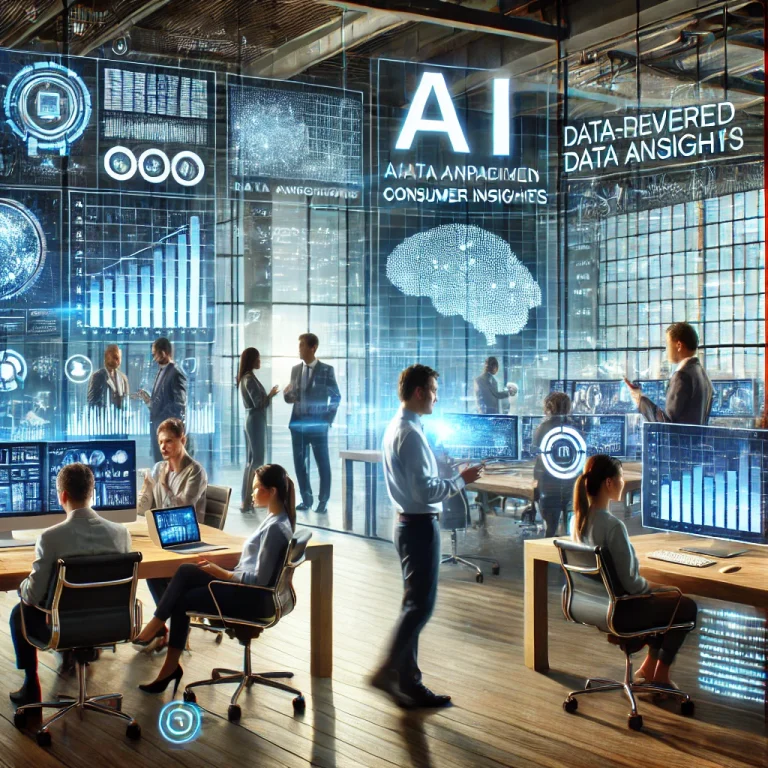The Impact of AI on Market Research and Consumer Insights

Artificial intelligence (AI) is revolutionizing market research and consumer insights by providing more accurate, comprehensive, and actionable data. This technology allows businesses to understand consumer behavior, predict market trends, and make data-driven decisions more effectively than ever before. Here’s a detailed look at how AI is transforming this field.
Enhanced Data Collection and Analysis
AI-driven tools have the ability to collect and analyze vast amounts of data from a multitude of sources, including social media, online reviews, and customer feedback. Natural language processing (NLP) allows AI to interpret and analyze text data, uncovering trends and sentiments that traditional methods might miss. This comprehensive analysis helps businesses gain a deeper understanding of consumer behavior and preferences.
For instance, an AI system can analyze social media conversations to identify emerging trends or shifts in consumer sentiment. By understanding what consumers are talking about and how they feel about certain products or services, businesses can tailor their offerings to better meet market demands.
Predictive Analytics
One of the most powerful applications of AI in market research is predictive analytics. AI algorithms can identify patterns and trends in historical data to predict future consumer behavior. This capability allows businesses to anticipate market changes, adjust strategies proactively, and make informed decisions.
For example, an AI-powered predictive model can forecast the success of a new product launch by analyzing similar past launches and current market conditions. This predictive power helps companies minimize risks and allocate resources more efficiently.
Real-Time Insights
AI provides real-time consumer insights, enabling businesses to respond swiftly to market dynamics. In today’s fast-paced market environment, where consumer preferences can change rapidly, real-time analytics are invaluable. Companies can adjust their marketing campaigns, product offerings, and customer service strategies promptly, ensuring they remain relevant and competitive.
Consider a scenario where a retailer uses AI to analyze customer feedback in real-time during a product launch. If the feedback indicates a particular feature is unpopular, the company can quickly address the issue, potentially saving the product from failure.
Personalized Consumer Experiences
AI helps businesses deliver personalized experiences by analyzing individual consumer data. Personalization can range from tailored marketing messages to customized product recommendations. By understanding each consumer’s unique preferences and behaviors, businesses can enhance customer satisfaction and loyalty, leading to increased sales and retention rates.
For instance, a streaming service might use AI to recommend content based on a user’s viewing history and preferences. This personalized approach not only improves the user experience but also increases the likelihood of continued subscriptions.
Automation of Repetitive Tasks
AI automates repetitive and time-consuming tasks in market research, such as data entry, survey distribution, and basic data analysis. This automation frees up researchers to focus on more strategic tasks, such as interpreting data insights and developing actionable recommendations. As a result, the efficiency and effectiveness of market research efforts are significantly improved.
For example, an AI tool can automatically categorize open-ended survey responses, saving researchers countless hours of manual work. This automation ensures that data is processed quickly and accurately.
Case Study: Retail Industry
A major retail company implemented AI-driven market research tools to gain deeper insights into consumer preferences. By analyzing social media trends and customer reviews, the company identified a growing interest in sustainable products. This insight led them to adjust their product line and marketing strategy, resulting in a 20% increase in sales of their eco-friendly products. The real-time data analysis also allowed them to quickly respond to market changes, maintaining their competitive edge.
This example demonstrates the power of AI in transforming raw data into actionable insights, enabling companies to stay ahead of market trends and consumer demands.
Future Prospects
The future of AI in market research and consumer insights is promising, with continuous advancements expected to further refine its capabilities. Future developments may include more sophisticated sentiment analysis, enhanced predictive models, and greater integration with other business intelligence tools. As AI technology evolves, it will continue to provide deeper, more precise insights, helping businesses stay ahead in the competitive market landscape.
For instance, advancements in AI could lead to the development of even more intuitive tools that provide real-time feedback and predictive insights on consumer behavior. These tools could integrate seamlessly with other business systems, offering a holistic view of the market landscape.
Conclusion
AI is fundamentally changing the way businesses conduct market research and understand consumer behavior. By leveraging advanced data collection, predictive analytics, real-time insights, and automation, AI provides businesses with the tools they need to make informed decisions and stay competitive. As the technology continues to evolve, its impact on market research and consumer insights will only grow, offering even more opportunities for businesses to enhance their strategies and connect with consumers.
For more information on how AI can enhance your market research efforts, visit Certainly’s platform page. Additionally, to explore how AI-driven solutions can benefit your business, check out Certainly’s pricing page for detailed information on their offerings and pricing models.

